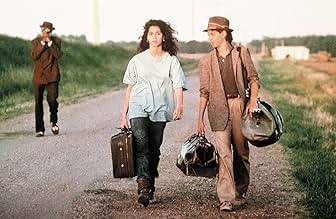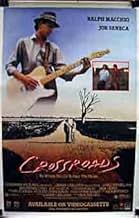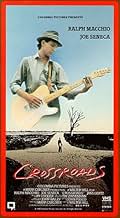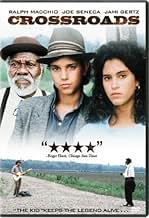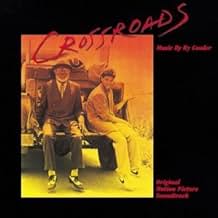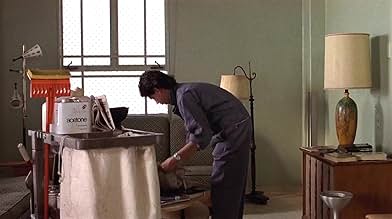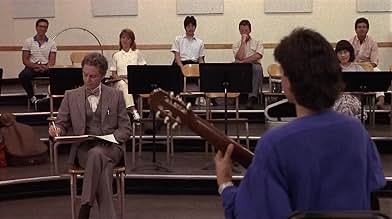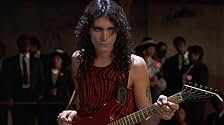Ralph Macchio é “Lightning Boy”. Um garoto que consegue fazer a guitarra cantar. Blind Dog é um profissional veterano que sabe disso. Juntos, eles partem para um lugar onde os contratos são ... Ler tudoRalph Macchio é “Lightning Boy”. Um garoto que consegue fazer a guitarra cantar. Blind Dog é um profissional veterano que sabe disso. Juntos, eles partem para um lugar onde os contratos são fechados. E onde nascem as lendas.Ralph Macchio é “Lightning Boy”. Um garoto que consegue fazer a guitarra cantar. Blind Dog é um profissional veterano que sabe disso. Juntos, eles partem para um lugar onde os contratos são fechados. E onde nascem as lendas.
- Direção
- Roteirista
- Artistas
- Prêmios
- 1 vitória no total
- John McGraw
- (as Tex Donaldson)
Avaliações em destaque
It has everything that I love in a movie: good story, great characters well acted, fine comedy and powerful touching drama. Ralph Macchio is a brilliant young guitar student, Eugene Martone, at Julliard (or some other equally good music school) who does not want to play Mozart. He wants to play guitar like his idol, a long dead blues guitar legend. In search of his dreams, he breaks an elderly black blues player out of a prison nursing home.
The two of them go on an odyssey to the Mississippi Delta in quest of memories and dreams. As in any odyssey, they meet a variety of fascinating and/or dangerous characters along the way. Eugene must also overcome the obstacles and tests that all those who quest must face - until it is time to face the ultimate test against the greatest blues guitarist in the Delta.
I enjoy music, but my knowledge is superficial. I probably wouldn't know a good guitar riff from a raft, but even I could recognize awesome guitar work in the final sequence of Crossroads.
So, if you like good movies and good acting and great guitar music, please check out Crossroads. If enough of us spread the word, it may no longer be a forgotten classic.
I was experiencing the hilarious "My cousin Vinny" the other day and he played another original character, being that one of his last important roles. Maybe what I feel is compassion because he couldn't make it as an elder man, and I really wanted to watch him grow. Maybe I miss his first and few big breaks, where he literally knocked me down; one of those being "Crossroads".
He was 25 at that time, but still had that 17-year old look, where you would have said: "Wow, he's 17 and in main role" Well, I'd have said that. "Crossroads" is an inspiring tale about life and music; blues. It was not the first time that a filmmaker tried to relate music with life. I have personally never had doubts about it, because music is life for me; but in this film, for writer John Fusco it was about growing up, understanding the gift and use it for good.
Macchio portrayed Eugene Martone, a naive guy, gifted guitar player, crazy driven by the magic of blues. The love for music makes our mind think unconsciously about getting far, being big; and Eugene wants to go to Mississippi to get his chance, but needs someone who knows Robert Johnson's lost melody, knows the way, and has even lived it, if you know what I mean. In this story, that character is blues master Willie Brown (a tremendous Joe Seneca), now forgotten in an asylum, probably crazy (although he says he isn't but some brilliant sequences show him out of place) and without his car. But Eugene will get him out of there and they'll both start that journey together.
What happens next, including the various stops, problems, Ralph Macchio's wonderful guitar playing abilities and encounter with beautiful girl Frances (radiant and talented Jami Gertz) is for the viewer to discover. Now, how the title relates it's touching and interesting, but where director Walter Hill triumphs (and this is something that should never be forgotten for music movies nowadays) is in knowing that the story is there. The heart of his film lies in the development of the kid's and the old man's relationship.
When we now see movies about music that sometimes don't even have a clue "musically" and most of the times there is music to promote an artist in the film, because he/she sings; in Hill's "Crossroads" and in the relationship I was talking about, the discussions, conversations, walks and even music playing, hide some of life's deepest interrogations. And I regret saying blues is always the same, because even when it is, it is one of those musical styles, like jazz, that not many listen but when they do discover their power. It's in the eyes of the musicians when they play where you can see it; they love being in that scenario, and that's just magical.
Eugene Martone, considered a prodigy on the classical guitar, is a young Long Island man attending the prestigious Julliard Music School. Problem? He prefers the blues over classical. And he's on a quest. He uncovers evidence that blues guitar legend, Robert Johnson, composed 30 songs. Since only 29 were ever recorded, he becomes obsessed at finding the 'lost' song number 30 (and being the first person to record it). And, after some sleuthing, he finds an old photograph and a news clipping -- pointing him toward the only living person who would know that song and who, fortunately, lives nearby. His name is Willie Brown (aka Blind Dog Fulton, aka Smokehouse Brown), a friend of Robert Johnson who traveled and performed with him (harmonica/vocals). Brown lives in a penal facility for old people (a criminal's nursing home). At first, Brown denies his true identity. But confronted with a photo of himself next to Robert Johnson, Brown finally admits the truth. And, he agrees to teach Martone the lost song -- but ONLY if Martone breaks him out of the facility and takes him back to Mississippi.
The catch? Martone knows that lore surrounding Robert Johnson says he sold his soul to the Devil. What he doesn't know is that it's fact, not lore ... and that Willie Brown did the same thing. And Martone doesn't know that Brown's reason for going back to Mississippi is to return to the 'crossroads' where he and Johnson sold their souls in hopes of getting the Devil to release him from his contract. This culminates in an eerie finale where Martone gambles his soul in a blues duel with the Devil's own guitarist, Jack Butler ... to save Brown from eternal damnation.
Director Walter Hill is masterful, combining music, drama, alternate history, fantasy, and horror into a single plot. Kudos must also be given to screenwriter John Fusco for giving Hill a masterful script to work from. But contrary to most people, my favorite scene isn't the blues duel. It's the scene where Martone wakes up to find out a girl he met in his travels with Brown (and had a romantic interest in) has unexpectedly left them to go her own way. And immediately after that, Brown admits he lied... that there never was a song number 30. At that moment, Martone, who'd been merely a good blues 'player' up to that point picks up his guitar and begins to play a sad blues song ... one certainly coming from his soul, not from his memory of what others have played. It is that momentary 'graduation' scene (the transition between blues 'player' and blues 'man') that sets the stage for the duel ... with film watchers knowing Martone is as ready for it as he can be.
This kid Eugene (Ralph Macchio) is a classical guitar student with an obsession with the blues. Despite the disapproval of his teacher, he longs to be a bluesman just like his heros of the 30s and 40s. When he gets word of a lost song by the late, great Robert Johnson, he hunts down Johnson's still-living harp player, Willie Brown (Joe Seneca). Willie is a cantankerous old man who spends his days rotting away down at the nursing home. It doesn't take the kid long to track down the old man and make a little deal: If he helps the geezer bust out of the old-folks home, then the geezer will in turn, teach the kid the long lost song. You see, they're in New York and the old man has to get home to the delta to settle an old score. Thus, the road trip begins...hobo-style.
To give much more away would be a crime, but the kid and the geezer are well matched and this gives the movie a lot of laughs and LOADS of memorable quotes from the old man. Joe Seneca was a great actor and I believe this was one of his best performances. Ralph Macchio is perfect as the kid and we really do believe that he is obsessed with the blues. Jami Gertz also gives a credible performance as the temporary love interest. She's perfect for the part.
I really can't praise this movie enough. The music alone, is enough to reccommend it (Ry Cooder rocks as always) and if you're into the blues, chances are you've already seen it. If you can find this one, it's well worth a rental. I guarantee that you won't watch it just once. I can't wait for the dvd. 10/10
Você sabia?
- Curiosidades"Eugene's Trick Bag", the updated classical piece at the film's climax, is largely based on Niccolò Paganini's "Caprice #5". According to myth, Paganini sold his soul to the devil for his musical skills. Steve Vai replicates Paganini's legendary rolling eyes, long unkempt hair and gaunt look.
- Erros de gravaçãoAt the time the movie was filmed, Julliard did not offer classes in classical guitar.
- Citações
Willie Brown: The blues ain't nothin' but a good man feelin' bad, thinkin' 'bout the woman he once was with.
- ConexõesFeatured in At the Movies: Salvador/Smooth Talk/Crossroads/Turtle Diary (1986)
Principais escolhas
Detalhes
- Data de lançamento
- País de origem
- Central de atendimento oficial
- Idioma
- Também conhecido como
- Encrucijada
- Locações de filme
- Empresa de produção
- Consulte mais créditos da empresa na IMDbPro
Bilheteria
- Faturamento bruto nos EUA e Canadá
- US$ 5.839.031
- Fim de semana de estreia nos EUA e Canadá
- US$ 2.071.680
- 16 de mar. de 1986
- Faturamento bruto mundial
- US$ 5.839.031
- Tempo de duração1 hora 39 minutos
- Cor
- Mixagem de som
- Proporção
- 1.85 : 1




